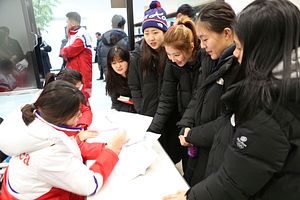“We are one.”
That was the shout from the unified North and South Korean women’s ice hockey team, a first in Olympic history, when they met on January 25.
The two teams officially began their journey as a unified Korean women’s ice hockey team on Thursday as 15 members from the North joined the South at the Jincheon National Training Center.
Director of the Jincheon National Training Center Lee Jae-geun, Vice Director Lee Ho-shik, and Chairman of the Korea Ice Hockey Association Chung Mong-won greeted the North Korean team’s head coach Park Chul-ho and the team members.
Park said he was “especially happy to see North and South become one,” adding that there will be “great results if they assemble their mind and strength to play a good game.”
Chung said that “South Korea’s head coach, Sarah Murray, has done a great job trying to unify the team,” adding that the unified team should immediately start working on things as basic as language.
North Korea says “hokei” for hockey, while South Korea says “haki.”
Despite the cold weather, the North and South Korean teams seemed to greet each other warmly. The South Korean team lined up to deliver bouquets to their North Korean partners as they welcomed them.
Park Jong-ah, a South Korean forward, said she’s starting to “actually feel what it’s like to be in a unified team.” Shin So-jeong, a South Korean goalie, said “the new locker rooms are definitely giving off a sense of reality,” adding that “we’ll have to do our best to get prepared now that we only have such a short time.”
As part of the momentum after high-level inter-Korea talks, North and South Korean officials met at a working level discussion held at Panmunjom on January 17, and agreed to form a North-South unified team for women’s ice hockey. The two Koreas will also march together under a unified Korean flag during the opening ceremony of the Olympics.
The agreement was then passed to the International Olympics Committee for review. The IOC delivered final approval on January 20 for the creation of a unified ice hockey team, as well as North Korea’s participation in four other events, including skiing and figure skating.
The 35-member unified women’s ice hockey team is allowed to have only three North Korean players in each game, as a result of a heated negotiation that eventually ruled out North Korea’s original push for five players per game. Do Jong-hwan, South Korea’s minister of culture, sports and tourism said that “three was the maximum number that our head coach could accept, and that’s how we explained during the negotiations.” In ice hockey, each team starts six players in a game.
The unified team will have the unified Korean flag on their uniforms, and use the Arirang as the national anthem. They will also be using “COR” as their country abbreviation. In other events, however, North and South Korea will be competing separately.
The creation of a joint ice hockey team for the PyeongChang Winter Olympic Games has been a controversial issue in South Korea, and may have factored in a recent plunge in approval ratings for South Korean President Moon Jae-in.
President Moon’s approval ratings hit their lowest level since he came into office, 64 percent, and his disapproval ratings rose from 20 percent to 27 percent over the past two weeks. The plunge was the steepest among the 20-30s age groups. Analysts say the unified ice hockey team was a critical factor in the plunge.
More than 47,000 people signed a petition posted on the Blue House website against the unified ice hockey team. Many of the petitioners were worried that creating a unified team was a result of “politics overruling fairness,” which is something they may feel particularly sensitive about, ever since the political fiasco led by former President Park Geun-hye and Choi Soon-shil took place. The massive scandal centered around Choi receiving special benefits because of her close friendship with Park.
Petitioners were also concerned that the use of “a unified Korean flag” and Arirang would deprive them of their “South Korean identity.” Some have even gone so far as to call the PyeongChang Olympics the “Pyongyang Olympics.”
Experts argue that South Korea’s younger generations are becoming more indifferent to North Korea, as they see North Korea as an “indecisive country” that provokes and shakes hands at the same time.
Younger South Koreans’ perception of North Korea has grown a lot colder, cold enough to uphold the spirit of fair competition in sports rather than the ideal of unified compatriotship. The sense of friendship and unity that we saw back in 1991, when a unified Korean women’s table tennis team made history by winning the world championships for the first time in 18 years, is nowhere to be seen.
South Korean identity seems to be going beyond the former confines of “one nation, one people” to become more internationalized, which is something the older generations at the Blue House do not seem to have expected.
There are definitely opposing views, however. More than 90,000 people signed a petition calling for the removal of PyeongChang Olympics Organizing Committee member Na Kyoung-won, who was blamed for sending a complaint letter disapproving the unified team to the International Olympics Committee and the International Paralympics Committee.
The political battle over North Korea’s participation at the PyeongChang Games continues to unfold in South Korea. Although Moon’s approval rating took a toll, the Na Kyoung-won letter incident and the rather cheerful welcoming of the North Korean ice hockey team seems to be changing the tide for the better, and will, hopefully, contribute to the success of the PyeongChang Winter Olympic Games.

































